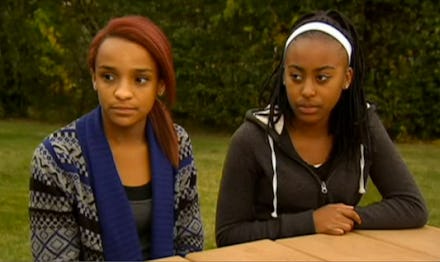Teacher Goes on Racist Tirade — And These 13-Year Olds Teach Her a Lesson of Their Own

How hard is it, really, for white people to take the lead from people of color during discussions about racism?
For one white Chicago-area substitute teacher, the dialogue would've been easier if she listened to four of her middle school students — all of whom insisted upon not being called African-American in the classroom. Why? Because they're Jamaican, and none of them are from Africa.
But the racist tirade that came next was nothing like what the group of 13-year-olds would've ever expected from someone charged with leading their classroom. After the teacher explained that African-American is the proper and politically correct term to call them, she crossed the line. In a major way.
For the remainder of the 80-minute class period, she referred to the four Jamaican students as slaves and used the N-word, despite the students' protests and tears.
"I just want people to know how much it affected us and I don't want this to happen to anybody else," student Zaria Daniel told Chicago's NBC 5 News. According to the report, the suburban school district investigated the incident, during which the substitute teacher confirmed the students' account, which resulting in the instructor's firing.
Although the unfortunate incident was handled swiftly by officials, it highlights the perennial conversation surrounding "labelling" black people. It's not OK to call black people the N-word, and African-American doesn't apply to everybody.
It's about time we rethink — or maybe even retire — the term "African-American" altogether.
Many black Americans have ancestral roots dating back to the slave trade in Africa, and they're part of what's called the African Diaspora: communities in countries and regions around the world that have ethnic and cultural roots in Africa. Yet it's important to keep in mind a message that the mainstream media has failed to convey for decades: Blackness in America is not a monolithic experience.
America has constructed race along a spectrum defined by white supremacy. Various ethnicities and national origins get erased from everyday consciousness when they're lumped into broad categories that ignore the culture, politics and religion central to individual communities.
Although the instructor in the classroom at Jay Stream Middle School in Carol Steam, Illinois, may have had a limited understanding of this fact, it's important to remember that terminology evolves over time. Terms like the N-word, jigaboo, monkey, colored, Negro and black ultimately emerged as the community continued to hash out their shared identity from a position of pride and self-determination against the backdrop of white supremacy.
White people do not and should not have the right to determine what or how to label people who are black.
Keep in mind that African-American as a term steadily eased into mainstream acceptance mainly because black Americans wanted to make very clear that their roots are indeed not in the United States, but in the land from which they were stolen and shipped across an ocean against their will. Sadly, many black people will never know specifically where in Africa their ancestors lived, because black lives weren't valued enough to record and preserve such documentation — which some white people might otherwise take for granted.
That's why we should celebrate these young students who demanded their racial and ethnic identity be honored in the classroom. As far as they are concerned, they have been and will always be Jamaican, because that's the country with which they most closely associate their ancestral roots. Even as they are black in America and part of a larger diaspora, the teens' heritage is not lost on them.
At the end of the day, these young women have the right idea: No matter what, white people have zero say in how black and African-descended people label themselves or how they wish to be identified.
As angering as this teacher's remarks are, the real tragedy would be if these young black women did not assert their agency and demand their heritage be honored in a conversation about race — even if it outrages or offends an older white woman.